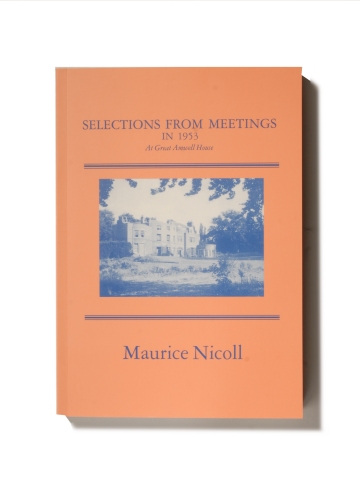
SELECTIONS
FROM MEETINGS 1953
Maurice
Nicoll
REGARDED from a strictly factual viewpoint, this book comprises further commentaries by Maurice Nicoll on his widely appreciated Psychological Commentaries on the Teaching of G.I. Gurdjieff and P.D. Ouspensky, mainly on papers in the final, fifth volume. It could almost be a second appendix to that collection. In the aspect of value, however, Selections from Meetings in 1953 can stand alone; it has the potential to show the perceptive reader a challenging pattern for the true conduct of life. Even to those familiar with The Work, a telling phrase in Nicoll's inimitable style may pierce the veil obscuring their understanding of a vital part of the teaching
It is not surprising that this selection contains potent ideas; it reflects Nicoll's thoughts on The Work at the culmination of his life and his teaching.
The commentaries here published for the first time were read to members at the Nicoll group house at Great Amwell, a village near Ware, between March and August 1953 and all except one elaborate on commentaries given in the same period and published in Volume 5 of The Commentaries. The exception, Singing Your Song, amplifies a paper read at Great Amwell House a decade earlier, in February 1943. Its very title suggests that it owes its selection to Nicoll's down-to-earth manner of dealing with esoteric questions. It is an approach that in this short paper opens up new ways of observing the results of Internal Considering, one of the big ideas of the The Work.
Most of the new commentaries were responses to group members' questions about sections of the readings or explanations that they had not understood. The final one, however, is a report of Nicoll's words immediately after his paper had been read at his final group meeting, on 16th August 1953. Beryl Pogson who, with publisher Vincent Stuart, read the paper to that meeting has quoted passages of her teacher's last meeting in her biography Maurice Nicoll: A Portrait. A full record of this talk, together with the group members' questions that occasioned it, is published herein.
It is a fitting climax to the book, dealing with the observation of attitudes to The Work and also presenting a strong case for Nicoll's belief that, for all of us, it is self-conceit that keeps out consciousness. He explains how the remedy can be found in the inner meaning of the Gospel phrase "Blessed are the meek".
Nicoll was one of the most committed of Work teachers to Gurdjieff's revelation that at its core his system of knowledge and practice is Esoteric Christianity. There was none of the calming piousness of exoteric religion in Nicoll's approach. This book shows he was forthright in his criticism of those who came to Work meetings but failed to make the required effort.
"If you are unable to distinguish between a truth and a lie, I cannot help you," he says in one of the new commentaries. Our conceit might lead us to imagine we are exempt from this helpless category, but then he points out that Negative Emotions are always lies and we all continually enjoy them. It is a shock to see that we could be among those he condemns as being no good, as we are, to him or The Work.
Hopefully, such shocks will activate us towards seeing our true condition. And our potential. Among Nicoll's farewell words to his group was the instruction: "What I am trying to say is that each one of you has something to work on and you must try to find it".
Selections from Meetings
in 1953 could help in that search.
BACK